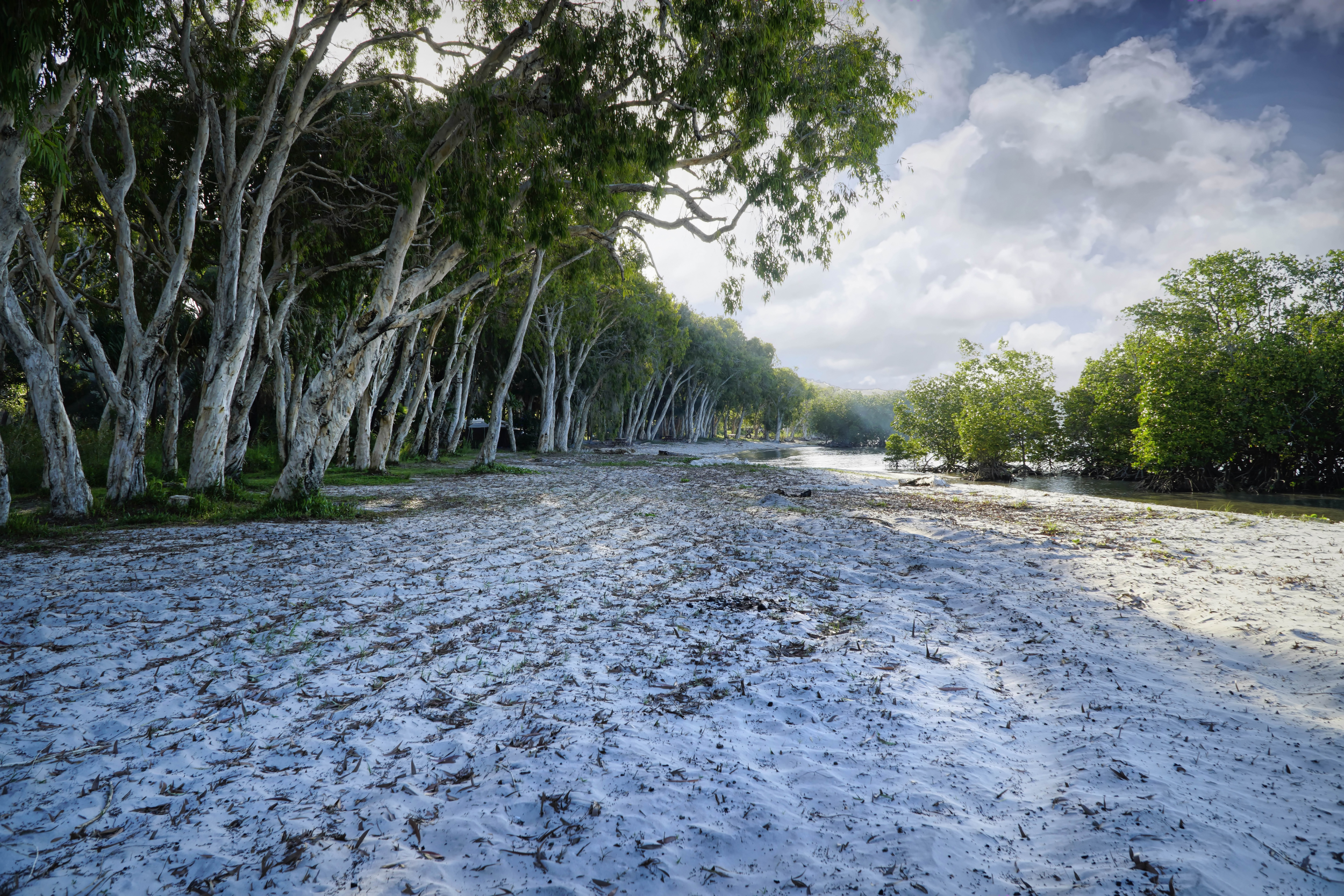Overview
Between 1 July 2017 and 29 February 2020, the Queensland Government awarded $197 million in sports grants. These grants are investments in community facilities and sporting clubs to enable Queenslanders to enjoy an active lifestyle.
This information brief focuses on whether the awarding of sports grants was in accordance with documented processes that were appropriate and resulted in the impartial awarding of grants.
Tabled 29 September 2020.

In brief
This information brief presents facts relating to the awarding of sports grants by the Department of Housing and Public Works, and the Minister for Housing and Public Works, Minister for Digital Technology and Minister for Sport, in the period 1 July 2017 to 29 February 2020. It focuses on whether the awarding of sports grants was in accordance with documented processes that were appropriate and resulted in the impartial awarding of grants.
We prepared this information brief after it was reported that Commonwealth sports grants were awarded to applicants who were not assessed as the most meritorious according to published program guidelines. We have not performed a full audit, but have gathered facts through our interviews, observation of processes, analysis of data, and review of grant approvals and other documentation.
Design of sports grant processes
Merit-based processes should be used to award grants, and ministers should rely on these departmental processes for the delivery of grant outcomes. This is similar to good procurement or recruitment practices, which rely on an appointed panel to recommend the successful applicant. The assessment and selection processes should be transparent, demonstrating the equitable awarding of grants.
From 1 July 2017 to February 2020, departmental processes had the minister as the decision maker for the awarding of sports grants. The design of these processes lacked clarity in defining the roles of the department and the minister. Under these processes, the minister made changes to around one per cent of departmental recommendations, relating to two grant programs.
It is important that all grant documentation clearly articulates responsibility for the two outcomes—final selection and approval of grant recipients, and financial approval of expenditure. The decision-making roles must align with financial accountability obligations set by Queensland Treasury. Further clarity on roles and responsibilities in the final selection and approval of grant recipients, as well as financial accountability, could be provided by Queensland Treasury in the Financial Accountability Handbook.
Awarding of sports grants
Between 1 July 2017 and 29 February 2020, the Queensland Government awarded $197 million in sports grants.
Applications for competitive grants—those that are assessed against criteria and require judgement to determine those with merit—were successful at a mostly consistent rate across electorates for the three political parties that represent 96 per cent of state electorates.
Between 1 July 2017 and 29 February 2020, in accordance with their own procedures, the department asked the minister to approve almost all of the competitive grants. Of the 2,900 competitive grants approved by the minister, the minister made 33 changes to the department’s recommendations for two grant programs—representing a change to around one per cent of all grants recommended for approval.
Additionally, the minister selected 46 recipients for consideration by the government to support the commencement of the implementation of the Activate! Queensland strategy.
Improved record keeping required for interactions with the minister
Various briefing notes provided to the minister did not clearly state what was being requested and did not distinguish between the approval of the grant recipient and financial approval of the grant expenditure.
In those instances where decisions have been made by the minister that were not based on the department’s recommendations, the department did not produce adequate records relating to the awarding of grants. The department has not met the Queensland Government requirements for record keeping of decision-making in its interactions with the minister.
Departmental processes have been revised
The department finalised the changes to its sports grant processes in February 2020 to reflect that the director-general is the decision maker for grants. Grants are now approved by the director-general and noted by the minister. For this reason, we have not made any specific recommendations to the department in this information brief.
Recommendations
We have identified the following recommendations:
Financial accountability |
|
|
QT1 |
Queensland Treasury should update the Financial Accountability Handbook to provide clarity on the role of a minister in the selection and approval of grant recipients. This could include practical guidance on the provision of advice and recording of decisions. |
|
D1 |
Departments should ensure their processes are designed to achieve compliance with the Financial Accountability Act 2009 and the Financial Accountability Handbook—such that complete records are kept to support all decisions made in awarding grants, there is clear responsibility for approval of grant recipients, and financial authority rests with the director‑general. |
|
DPC1 |
Department of the Premier and Cabinet should support ministers and ministerial staff through training to ensure an understanding of ministerial and departmental responsibilities, including those included in the Financial Accountability Handbook. |
Ongoing compliance |
|
|
D2 |
When a machinery-of-government change occurs and functions move between departments, departments should promptly conduct a review to ensure consistency of fundamental processes (such as approvals) and compliance with the Financial Accountability Act 2009 and the Financial Accountability Handbook. |

1. About this information brief
Grants are a mechanism through which governments achieve their objectives for the communities they serve. Sports grants are investments in community facilities and sporting clubs to enable Queenslanders to enjoy an active lifestyle.
On 15 January 2020, the Australian National Audit Office tabled a performance audit on Commonwealth sports grants. It found that the Australian Government had disregarded the outcome of the formal assessment process and awarded grants to applicants who were not the most meritorious according to published program guidelines.
We have prepared this information brief to share key facts about sports grants in Queensland between 1 July 2017 and 29 February 2020. This period includes a state election—a time when political parties often make commitments regarding community and sporting facilities—up to the month we started working on the brief.
In preparing this information brief we have considered:
- how much money the government has spent on sports grants
- the process for awarding sports grants and whether the department has demonstrated financial accountability
- the minister’s role in awarding sports grants.
We interviewed Department of Housing and Public Works employees and the minister and his staff, reviewed documents, and analysed grant information. We focused on the eight grant programs outlined in Appendix B.
What this information brief is not
We have not re-performed the department’s assessment processes or reviewed their grant management processes subsequent to the awarding of grants. The purpose of this brief is to analyse information and present the facts, not to undertake a full evaluative audit that examines the efficiency and effectiveness of the department’s sports grant management. As a result, we have not provided a conclusion under the auditing standards.

2. What is the process for awarding sports grants under a competitive program?
The process for all grant programs
Sports grants are awarded in three ways:
- demand driven—all applications are approved if criteria are met
- competitive—applications are assessed according to criteria set by the department
- direct payment—without application.
All grant programs have similar (but not identical) phases, as shown in Figure 2A. There are differences in the way they are advertised to applicants, the degree of subjectivity involved in the assessment processes, and the extent of the requirements for monitoring and reporting.
By their nature, competitive grant applications involve subjectivity in their assessment against pre-determined criteria. The Department of Housing and Public Works assesses and recommends sports grant applications for approval. Until February 2020, the department made recommendations to the minister to award grants. From February 2020, these recommendations have been made to the director-general for approval.
Given the subjectivity involved in assessing competitive grant applications, any changes to recommendations for approval should be documented to demonstrate impartiality and transparency in decision-making.

Queensland Audit Office.
The minister’s role in the grant process
Cabinet is responsible for the development and coordination of the policies of the Queensland Government. A policy is an authoritative statement about the course of action the government plans to take and what it is seeking to achieve in its objectives for the community.
The policy for sports is part of the Activate! Queensland strategy, which is in turn an action under ‘Keep Queenslanders Healthy’ in the Queensland Government’s Our Future State: Advancing Queensland’s Priorities.
Ministers are legally accountable to parliament for the administration of their departments. The director-general of a department is responsible for its day-to-day management and for ensuring the efficient and effective delivery of department services to achieve government policy.
Grants administration should include clear accountability for all parties involved, including defining the respective roles of ministers and the public service. This should be reflected in grant guidelines, policies and procedures. The role of the minister may need to be defined at the beginning of each grant program.
The minister may be involved in the grant process, to provide approval to commence a grant program, or give feedback on the design of the grant program, including the establishment of criteria for assessment of the applications. The purpose of the minister’s involvement is to ensure the department’s operations are aligned with government policy.
The minister should rely on departmental processes for the delivery of grant outcomes—similar to good procurement or recruitment practices, which rely on an appointed panel to recommend the successful applicant. The minister may be advised of the outcome of the assessment process and the successful grant applicants, and can provide feedback to the department on the assessment outcomes. Any feedback from the minister would need to be appropriately documented by the department, particularly where it has resulted in any changes to the department's assessment outcomes.
The Financial Accountability Act 2009 and the Financial Accountability Handbook require financial approval to rest with the director-general but do not provide guidance on the approval of successful grant recipients.
The Financial Accountability Handbook should be improved to provide clarity on the role of a minister in approving grants, including how feedback is obtained, actioned and documented.
Approvals required in a grant process
There are multiple approvals required in a grant process, each with a different purpose. These are summarised in Figure 2B.
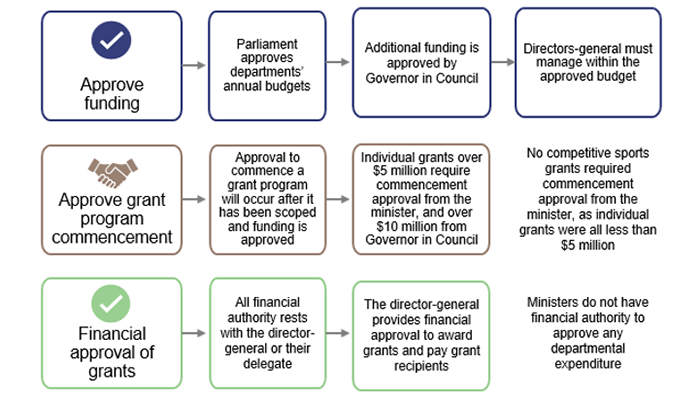
Queensland Audit Office.
We reviewed five competitive grant programs (outlined in Appendix B), making up 92 per cent of the $84 million in competitive funding awarded during the period.
For three of these programs, the department, in accordance with its then sports grant procedures, provided the minister with briefs for approval of grants.
These documents had inconsistent and interchangeable requests for funding and approval, so that it was unclear whether the department was seeking approval of the grant recipients alone, or was also seeking funding or financial approval.
In February 2020, the department finalised the revision of its processes and clarified its delegations. For this reason, we have not made any specific recommendations to the department in this information brief.
Competitive programs were assessed against published criteria
The department uses two types of competitive funding—open application processes and expressions of interest. Both processes require applicants to submit an application to be assessed against set criteria.
Different assessment criteria and scoring methods were applied by the department for different grant programs and funding rounds during the period from 1 July 2017 to 29 February 2020. Some criteria were common, as shown in Figure 2C.
|
Ability to deliver |
What is the applicant’s ability to deliver the proposed project? |
|
Community need |
What is the community need for the proposed project? |
|
Strategic priority |
How does the project contribute to strategic priorities, for example, by supporting lower socio-economic areas, areas of cultural and linguistic diversity, and Aboriginal and Torres Strait Islander peoples? |
Queensland Audit Office.
Historically, assessments of sports grants placed greater emphasis on an applicant’s ability to deliver a capital project. From July 2019, under the Activate! Queensland strategy, the department changed the way it managed and assessed sports grants. The strategic priorities of government became the focus.
We observed that the department used the published criteria to assess applications and recommend grants for approval, but we have not tested the effectiveness of the department’s assessment process to confirm the recommendations made from the assessment process.

3. Is the process for awarding competitive sports grants impartial?
Competitive grants, which are largely for capital projects, are assessed against criteria and awarded to those applicants that best satisfy the criteria.
Decisions about competitive grants can be subjective. For this reason, the processes must be seen to be clear, consistent, and complied with—to demonstrate impartial and transparent decision-making about the awarding of competitive sports grants.
Awarding of sports grants analysed by electorate
Approximately 2,900 competitive sport grants, with a value of $84 million, were awarded from 1 July 2017 to 29 February 2020. Of the competitive grant applications during the period, 59 per cent were successful.
Figure 3A shows the proportion of competitive grants awarded to electorates by political party between the 2017 state election on 25 November 2017 and 29 February 2020.
Queensland Audit Office.
Overall, applications for competitive grants were successful at a mostly consistent rate across electorates for the political parties that represent 96 per cent of the state’s electorates: the Australian Labor Party, Liberal National Party, and Katter’s Australian Party. In these electorates, the success rate ranged between 65 per cent and 68 per cent, with the average of all electorates being 66 per cent.
Awarding of sports grants over time
Until February 2020, the Department of Housing and Public Works' documented processes provided for the minister to accept, modify, or reject its recommendations. The department retained these processes when it took responsibility for sport and recreation in December 2017 following the state election. They were previously in place in the Department of National Parks, Sport and Racing.
In line with these processes, the minister made changes to the department’s recommendations for grant recipients in the Get Playing Places and Spaces and Female Facilities Program (see Appendix B). He was also responsible for selecting applicants to receive grants under Active Community Infrastructure Kickstart as part of the government’s Activate! Queensland strategy. Overall, the minister made changes to one per cent of the department’s recommendations.
In February 2020, the department finalised the revision of its processes and clarification of its delegations. Grants are now approved by the director-general and noted by the minister.
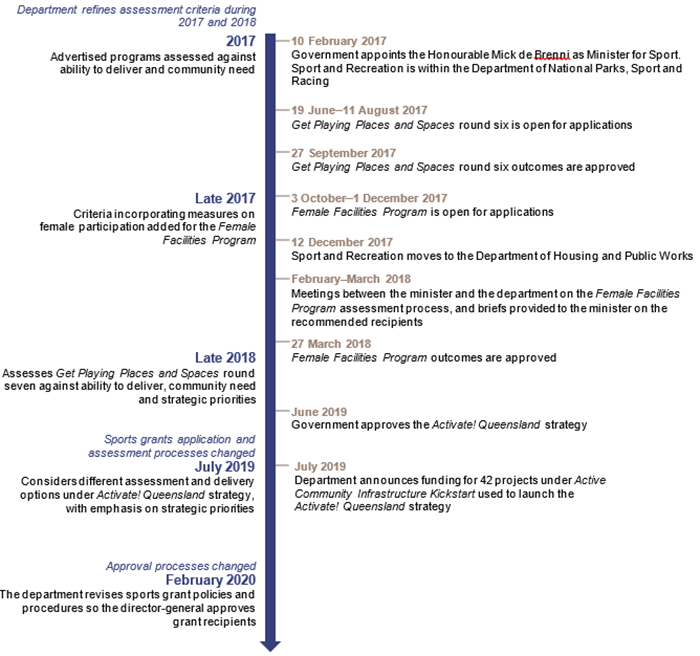
Queensland Audit Office
Changes made by the minister to the department’s recommendations in 2017 and 2018
Between 1 July 2017 and 29 February 2020, the department recommended approximately 2,900 competitive grant recipients. Under the departmental processes, the minister exercised his ability to modify departmental recommendations for 33 grant recipients, or one per cent of recommendations, mostly in relation to the Female Facilities Program.
Get Playing Places and Spaces round six (September 2017)
One modification was made by the minister to the grants awarded under Get Playing Places and Spaces round six, to award an additional $150,000 grant to a state sporting organisation. The minister was aware of the needs of the organisation and assessed the request as appropriate. The department had not recommended awarding the grant, as the organisation had not adequately demonstrated the need for the project.
The minister does not have any declared conflicts of interests relating to this organisation, and it is not within his electorate, but it is in a neighbouring electorate held by the Australian Labor Party.
Female Facilities Program (March 2018)
The minister made 32 changes to the department’s recommendations to award grants under this program. All of the changes made by the minister were considered eligible by the department. The minister approved 18 eligible grants that were not recommended by the department and rejected 14 eligible grants that the department had recommended. While the department summarised the decisions of the minister in a subsequent briefing note, there was no documentation of the reasons for the changes.
The department assessed the eligible applications against the grant applicant’s ability to deliver and community need for the project. The department prioritised applicants that had already undertaken the necessary planning, and had current female participants. The department gave a rating of high, moderate or low for each criteria, and used this to decide if an application should be recommended for approval or not—no applications assessed to have a low community need or low ability to deliver were recommended for approval. However, an overall project score or numerical order of merit was not established.
The briefing notes to the minister provided a description of the individual projects and whether they were recommended, not recommended, or ineligible, but not the individual assessment ratings for each applicant.
When the minister questioned the departmental recommendations, he was not satisfied that the department’s process contained appropriate investment logic, particularly relating to the assessment of community need. Communication between the minister and department in relation to this grant program is outlined in Figure 3C.
| Date | Nature of information provided |
|---|---|
| 9 February 2018 | The department endorsed a brief to the minister requesting approval of 41 recommended projects. One of the attachments to the brief described the department’s criteria and ratings, and provided an analysis of grant applications received and recommended by region, sport and socio-economic ratings. |
| 14 February 2018 |
A meeting occurred between the minister and the department to discuss the program. The department advised that after this meeting the minister requested an updated attachment to the original briefing note, with information on individual projects and why they were recommended or not. |
| 1 March 2018 | The original briefing note was updated to include a description of each project, the anticipated benefits, and why it was recommended for approval, had been assessed as ineligible or had not been recommended—but consistent and measurable information was not provided to support the department’s assessment. |
| 22 March 2018 | The minister requested changes to the department’s recommendations by writing on the brief dated 1 March 2018. The reason for the changes was not documented. |
| 27 March 2018 | The department summarised the minister’s requested changes in a subsequent briefing note, requesting the minister confirm approval of the revised projects. This included information on applicants receiving other sports grants, and resulted in the minister deciding to remove one application he had previously added. |
Queensland Audit Office.
As a result of the changes made by the minister under this program, the profile of grants changed as outlined in Figures 3D and 3E.
| Information analysed | Grants recommended by the department | Grants approved by the minister |
|---|---|---|
|
Socio-economic Areas are rated 1–10, with a lower rating indicating the area is relatively disadvantaged compared to an area with a higher rating |
64 per cent of eligible grants had a socio-economic rating of 5 or less 10 per cent of eligible grants were for areas with a socio-economic rating of 10, generally in Brisbane The average socio-economic rating was 4.2 |
57 per cent of eligible grants had a socio-economic rating of 5 or less 3 per cent of eligible grants were for areas with a socio-economic rating of 10, generally in Brisbane The average socio-economic rating was 4.6 |
| Sports |
Over 20 sports recommended for funding Various football codes—AFL, football, league, union, touch—accounted for 37 per cent of recommended grants |
Over 20 sports funded under awarded grants Various football codes—AFL, football, league, union, touch—accounted for 41 per cent of awarded grants |
| Regions | Funding recommended for each region ranged between 10–31 per cent of total funding, with North Coast (including North Brisbane and Sunshine Coast) recommended for the most funding |
Funding awarded to each region ranged between 9–45 per cent of total funding, with the most awarded to South Coast (including South Brisbane and Gold Coast) |
| Electorates by political party | The change in recommended grants resulted in grants awarded to Australian Labor Party electorates increasing from 44 to 68 per cent, while Liberal National Party electorates’ share of awarded grants decreased from 43 to 28 per cent. | |
Queensland Audit Office.
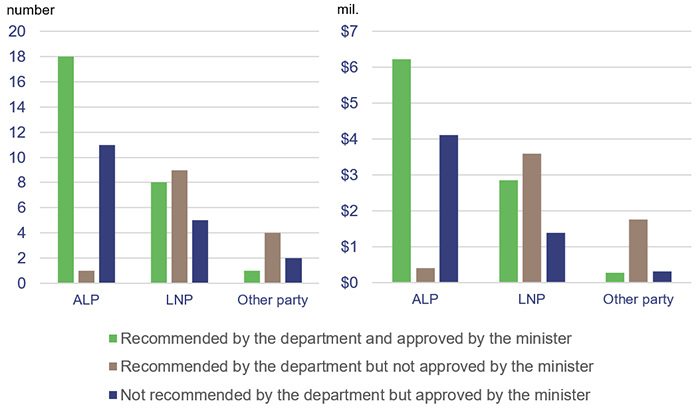
Note: ALP—Australian Labor Party. LNP—Liberal National Party.
Queensland Audit Office.
Two of the grant recipients approved by the minister but not recommended by the department were in his electorate, representing six per cent of Female Facilities Program grants. The minister had declared these sporting organisations on his Register of Members’ Interests because they were in his electorate, but he had no personal interest in them—he was not a patron or member of the organisations. The Clerk of Parliament advised in March 2017 that these interests did not need to be declared. The Integrity Commissioner advised in January 2020 that given the nature of these particular interests, they were unlikely to give rise in a fair‑minded observer to a conflict of interest, and no specific action was required to manage these interests.
The minister selected from the department’s list of eligible applications in June 2019
In mid-2019, while developing funding for the Activate! Queensland strategy, the minister requested the department provide a list of eligible grants to be considered for funding by the government under Active Community Infrastructure Kickstart. The department provided the minister with a list of 136 applications that had been through previous processes and assessed as eligible but not previously funded.
The minister selected 46 applications to fit within available funding. Neither his reasons for selecting these applications nor the assessment criteria used were documented. The department was unable to provide any official record between the department and minister to evidence this selection. The department has relied on an email provided by the minister’s office as confirmation of his intention to award grants as part of the new strategy.
The list of 46 contained three new projects that were not on the list of 136 eligible grants provided by the department. The department considered two of the three projects to be eligible and added them to the final list.
Minor revisions brought the final list of grants to 42, with a total value of $12.5 million.
The final list was proportionately the same as the department’s longer list for electorates held by each political party. The minister did not have any declared conflicts of interests relating to the final list and none of the grant applicants on it were in his electorate.
The application and assessment process changed from June 2019
The Activate! Queensland ten-year strategy provided a strategic framework for grants programs and expenditure on sport and active recreation in Queensland. Grant application and assessment processes changed from June 2019 with the new strategy. The approval process changed in February 2020.
The Active Community Infrastructure program, which is part of this strategy, uses an expressions of interest process rather than requiring a full application up-front. The program is advertised, and all interested applicants are asked to contact the department to discuss their project. The department then invites eligible applicants to apply to the grant program, providing them with a link to the application with a unique identifier.
Until February 2020, the department made recommendations to the minister to award grants. From February 2020, these recommendations have been made to the director-general for approval.
Members of parliament were advised of the program
For the Active Community Infrastructure program, the department prepared a letter and explanatory support material for the minister to share with other members of parliament. All members of parliament received a common letter containing a recommendation to contact their local Sport and Recreation Office. Local Sport and Recreation Offices provided advice to potential applicants, and they requested a central departmental office to provide the applicant with a unique identifier to support the processing of the application.
In addition to the letter sent to all members of parliament, an email was sent by ministerial staff to government members with information on the expression of interest process.
The email to government members contained the same email address used by local Sport and Recreation Offices to obtain the unique identifier for potential applicants.
The process of providing the unique identifier was the same for requests received from local Sport and Recreation Offices and directly from members of parliament.
Grants awarded under the new process
The department received over 450 enquiries from potential applicants, and 183 expressions of interest. Of these, 21 were approved, 22 are considered pipeline (possible future) projects, and 140 require further work by the applicant. While applicants for pipeline projects are not guaranteed future funding, they do not need to reapply under future funding rounds. The department has the opportunity to work with these applicants to develop the projects.
Figure 3F compares the applications received, approved grants, and pipeline projects for electorates held by each political party.
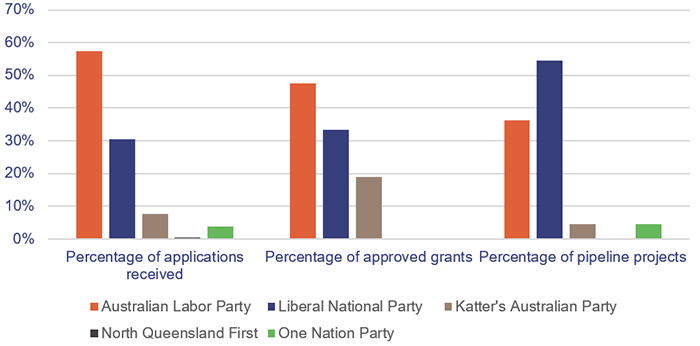
Queensland Audit Office.
The share of approved grants and pipeline projects is expected to change over time, depending on the extent of recent investment in community sport facilities.
Record keeping of decision-making processes needs to improve
Various briefing notes provided to the minister did not clearly distinguish between approval of the grant recipient and financial approval of grant expenditure.
Decision makers should document the reasons for decisions in awarding or not awarding grants to ensure decisions are transparent and defensible, and manage any perception of inequitable awarding of grants. The Financial Accountability Handbook states that if there is an absence of documentation, it has the potential to open the minister to accusations of bias or favouritism.
The department did not document why the minister awarded grants that were different from those it recommended under the Get Playing Places and Spaces and Female Facilities Program, or his justification for selecting grants under Active Community Infrastructure Kickstart.
The Financial Accountability Handbook has been designed by Queensland Treasury to assist departments in meeting their financial management requirements. Departments must comply with the handbook when it applies to their circumstances. Information Sheet 1.6 Obtaining and Documenting Ministerial Decisions from the handbook provides specific guidance on interactions between the department and minister.

Understanding sports grants dashboard
We have presented the sports grants data gathered for this information brief on an interactive map of Queensland. This allows a reader to explore and compare regional information on sports grants, as well as demographic and health information we consider relevant to understanding the local context.
While similar information may be used by the department in their assessment process, particularly with the recent focus on strategic priorities associated with health, we have sourced the demographic and health information independently of the department, from information published by the Australian Bureau of Statistics and Queensland Health.
The department uses two grants management systems for all grants—one system for Get Started and FairPlay vouchers, and the second system for all other grants. We sourced the raw data on grant applications received and awarded from these systems.
We classified grants as demand driven or competitive funding, other capital grants, and those relating to election commitments (refer to Appendix B).
We have not included in this presentation:
- grants administered by the department (including grants paid to Stadiums Queensland or on behalf of the Queensland Reconstruction Authority for disaster recovery), as the department is responsible for payment but not assessment or management of these grants
- Get Started or FairPlay vouchers by region, as this information was not available.
All applications recorded in the grants management systems include the sports undertaken at that location. Where multiple sports are listed on an application, we have allocated the awarded funding evenly between the sports (for example, football (soccer) and rugby union could both be listed on an application, and we have then allocated 50 per cent of awarded funding to each sport). We have presented information on the top 10 sports that were awarded grant funding.
